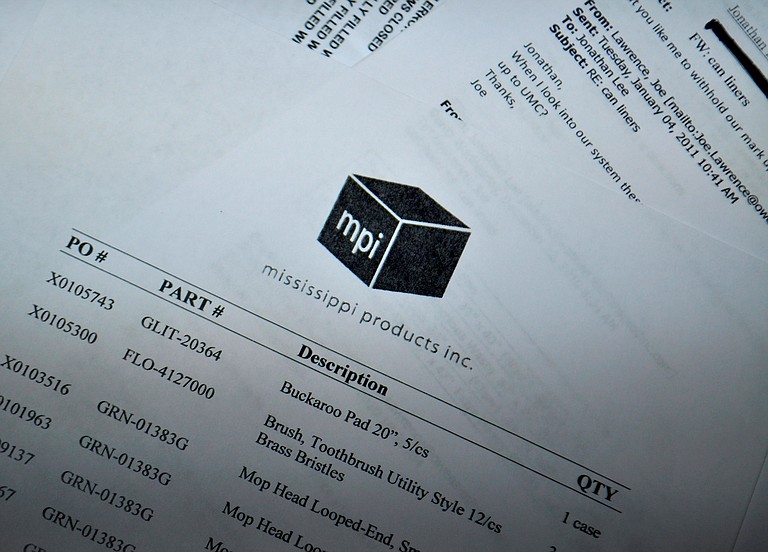Jonathan Lee says his family's company is on the hook for $200,000 because it got caught in the middle of a contract dispute between one of the state's largest hospitals and a national contract purchaser. Trip Burns
Thursday, May 23, 2013
The quagmire that ensnared Jackson mayoral candidate Jonathan Lee's family business, Mississippi Products, raises questions about the relationships between government agencies, group purchasing organizations and intermediary distributors such as MPI.
The saga began in 2008, when the University of Mississippi Medical Center entered into a contract with Irving, Texas-based Novation LLC, the nation's largest group purchaser with 2,911 hospital members nationwide and contracts totaling more than $37.8 billion per year. Like other mega-corporations, Novation's advantage is that it leverages its massive member network to get rock-bottom prices for customers such as UMMC from manufacturers.
In theory, hospitals like UMMC benefit from a GPO arrangement by getting goods at cheaper prices than if they bought directly from manufacturers. Manufacturers benefit by being able to sell huge quantities of products at a guaranteed price point.
Suppliers like MPI benefit as well. Under the agreement, MPI receives what's known as an inter-dealer stock price from a manufacturer at an "artificially high price," then sells it to UMMC for less than MPI paid for the goods. Once MPI proves the company sold the goods to the right person at the right price and not on the disposable-goods black market, the manufacturer gives MPI a rebate on the back end.
But five manufacturers are suing MPI and four of those companies have received default judgments in two states, while another lawsuit from a Wisconsin-based company is pending. Lee, who participated in a tight race for mayor against Ward 2 Councilman Chokwe Lumumba on May 21, hinted that his company's legal problems surfaced when the deal between UMMC and Novation went bad.
"When a contract goes south with a contract provider, then everybody is involved because they're the conduit," Lee told the Jackson Free Press editorial board in April. Lee said his company is now stuck with products a company ordered but has not paid for nor can it resell the goods to another customer, but it remains unclear why.
Whether the relationship between UMMC and Novation actually went sour is unclear so far, but hospitals say that getting the best price on supplies is of paramount concern. Jack Mazurak, a spokesman for UMMC, said that even if the hospital can save 5 percent on the $150 million it spends on purchasing each year, it is worth taking a second look at its GPO agreement.
Shawn Rossi, a spokeswoman for the Mississippi Hospital Association, said GPOs play a big part in controlling expenses as health-care costs continue to rise.
"Supplies make up the second highest expense in most hospitals, and health care group-purchasing organizations play an important role in using volume purchases to negotiate discounts," Rossi said.
But Mississippi lawmakers have questioned whether UMMC is getting the best bang for Mississippi taxpayers' bucks. In 2011, the legislative Joint Committee on Performance Evaluation and Expenditure Review (PEER), questioned whether UMMC's $126 million deal with Novation was a good deal for taxpayers after complaints arose about the hospital's purchasing practices and specifically whether UMMC was getting the best prices through Novation.
"UMMC should identify and consider all reasonable alternatives in procuring products and managing its supply chain," the report states.
The report goes on to say that should UMMC decide to continue its arrangement that Novation, the hospital should conduct thorough reviews to ensure that the GPO delivers the lowest possible prices.
Earlier this year, UMMC took those steps, issuing a request-for-proposals for a GPO. Angie Bolivar, a Novation spokeswoman, said the RFP is not evidence that the company's relationship with UMMC had soured.
"Hospitals put out RFPs from time to time to confirm the value they are receiving from their GPOs. In addition to that, in the case of state institutionslike University of Mississippi Medial Center (UMMC)they are often required by the state to put out RFPs at designated intervals. We believe that is what is occurring here," Bolivar wrote in an email.
Lee has said that MPI wasn't notified that its contract would not be renewed so it continued ordering products that the company cannot sell but that manufacturers want to get paid for. In all, MPI owes various vendors approximately $200,000, Lee told the Jackson Free Press in April.
"That may come down to one side versus the other," Mazurak said of the disagreement with Lee over timing of when UMMC alerted MPI that the contract would not be renewed. He said the hospital provided "weeks, if not more, heads up" to MPI that the contract was ending.
In the meantime, UMMC has continued to use MPI as a vendor but not at the same levels the hospital did when it did business under the group-purchasing agreement.

Comments
Use the comment form below to begin a discussion about this content.
Sign in to comment
Or login with:
OpenID